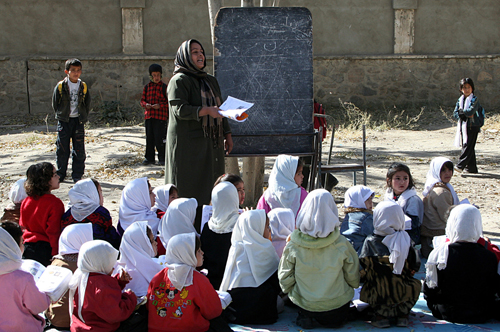KABUL - In its effort to make schools safer and ensure the right to education for all Afghan children, the Government of Afghanistan is mobilizing community elders in remote areas to help protect schools from insurgents’ attacks, according to a senior official from the country’s Ministry of Education.“One way to prevent attacks on schools in remote and insecure areas is by talking to community elders so that the community can protect their schools,” the General-Director of Teachers Education at the Ministry, Susan Wardak, said recently, according to the United Nations Educational, Scientific and Cultural Organization (UNESCO).
Ms. Wardak made the remarks last week at the UNESCO-organized launch, via video teleconference (VTC) at UN Headquarters in New York, of a UN guidance note to assist people monitoring, reporting and working to prevent attacks against schools and hospitals worldwide.
The Afghan official added that another measure the Ministry aims to implement is the provision of temporary alternative environments for girls to study and female teachers to receive training in.
Published by the Office of the Special Representative of the UN Secretary-General for Children and Armed Conflict, the Guidance Note on Attacks against Schools and Hospitals provides practical information for the UN and its partners on how to implement aspects of Security Council resolution 1998 (2011), which gives the UN a mandate to identify and list the armed forces and groups who attack schools or hospitals, or protected persons in relation to schools and hospitals.
In May 2012, the UN Assistance Mission in Afghanistan (UNAMA) said it monitored “unacceptable levels” of violence by anti-Government elements directed against schools, education institutions, their staff and/or students.
“UNAMA calls on anti-Government elements to stop such heinous attacks targeting children and education officials,” the UN political mission said at the time. “UNAMA also calls on the Government of Afghanistan and international military forces to ensure that effective security measures are in place to protect schools, students and teachers.”
The UN Children’s Fund (UNICEF) has previously noted that remarkable progress has been made in education in Afghanistan in terms of students’ enrolment since 2001. Enrolment has increased tremendously for both boys and girls, from just 900,000 in 2001 to around 8.3 million in 2011, of which 39 per cent are females.
Violence and intimidation were used to prevent girls and women from attending school during the Taliban rule of Afghanistan from 1996 to 2001.
Despite positive changes in the education sector since the fall of the Taliban regime in 2001, according to UNESCO, three million Afghan children remain out of school. Of these, 70 per cent are girls.
During the 20 May video conference, Ms. Wardak noted that an estimated 150,000 Afghan children do not have access to schools in insecure provinces of the country.
“People in Afghanistan understand the importance of sending their children to school and they will continue to strive to get their children their right to education,” said Ms. Wardak.
She also stressed the need for setting up a working group with responsibility to implement the guidance note in Afghanistan to help prevent attacks on schools and to better monitor and report any such attacks.
At the launching event, the United Nations Secretary-General’s Special Representative for Children and Armed Conflict, Leila Zerrougui, and the UNESCO Director-General, Irina Bokova, highlighted attacks on the schools as “a security crisis, a human rights crisis and a development crisis and we must act now.”
Ms. Bokova reiterated her concern that “conflicts are on the increase and children are in the front line with approximately 28 million girls and boys worldwide who have lost their right to education.”
UNESCO has assisted the Ministry of Education in designing a peace education curriculum, under which school-teachers are trained on identification of symptoms of post-traumatic stress in children.
Related articles:
- UN report urges Afghanistan to recruit female teachers locally to boost girls’ education
- UNAMA condemns recent attacks against schools in Afghanistan







